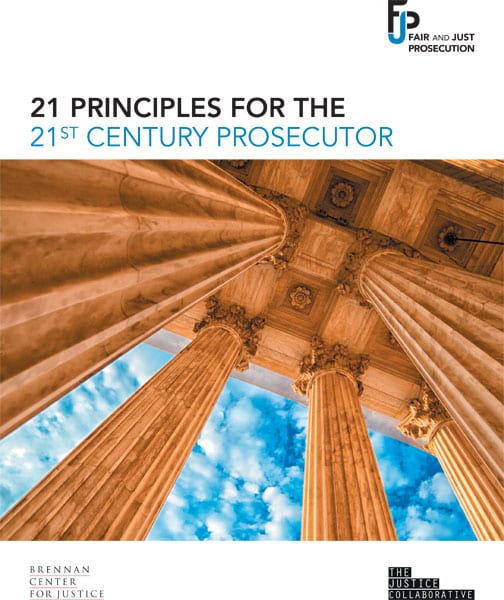
December 11, 2018; New York Times
In the past two years, progressive district attorneys have been elected in a wide range of cities, note Emily Bazelon and Miriam Krinsky in the New York Times. But will electoral victories be enough to uproot a racialized criminal justice system, which Michelle Alexander has labeled the New Jim Crow, built up over decades?
The stakes are high. The data are well known, but the physical and human costs are worth enumerating. The introduction of a new report from the nonprofit Brennan Center for Justice lists some of those costs:
Over the last four decades, the total incarcerated population in the United States has quintupled, to 2.2 million, or nearly one out of 100 adults. About 10 6 million people cycle in and out of jail each year. While the causes are complex, it’s clear that punitive policies have contributed to the incarceration build-up. These policies have included the war on drugs, over-policing of poor and minority communities, and harsh directives from legislators, like mandatory-minimum sentencing laws.
Bazelon and Krinsky are guardedly optimistic that these patterns can be upended. “Republicans and Democrats are among the reformers,” they write, “and they’re taking over district attorney offices in red and blue states. Five progressive D.A.s have been elected in major cities in Texas, of all surprising places, most recently in Dallas and San Antonio.”
Bazelon and Krinsky cite a number of examples of where changes are taking place:
Sign up for our free newsletters
Subscribe to NPQ's newsletters to have our top stories delivered directly to your inbox.
By signing up, you agree to our privacy policy and terms of use, and to receive messages from NPQ and our partners.
In Chicago, State Attorney Kim Foxx raised the threshold for felony theft prosecution to reduce the number of shoplifters who go to jail. In Philadelphia, the District Attorney, Larry Krasner, has instructed his prosecutors to make plea offers for most crimes below the bottom end of Pennsylvania’s sentencing guidelines. In Kansas City, Kansas, District Attorney Mark Dupree created a unit to scrutinize old cases haunted by questionable police practices despite opposition from local law enforcement. More broadly, many of these new, progressive prosecutors are declining to prosecute low-level marijuana offenses and have stopped asking for bail in most misdemeanor cases.
Yet progress remains difficult, and even victories that occur are often undermined by new obstacles, as in California, where the state government voted to abolish cash bail but also voted to replace cash bail with a system of judicial preventive detention that many social justice advocates, including Alexander, fear will reproduce old racist patterns.
The Brennan Center report, titled 21 Principles for the 21st Century Prosecutor, seeks to provide a path forward. The report is split into two sections. One section of 10 principles focuses on ways to reduce mass incarceration through such means as encouraging treatment rather than criminalization for issues that are really more about mental illness and drug addiction, as well as using the juvenile justice system to keep kids out of jails. A second section of 11 principles focuses on how to increase fairness in the system, by such means as addressing racial disparities, ending the poverty trap of fines and fees (as was endemic in Ferguson, Missouri where Michael Brown was killed by police), and changing police culture.
The recommendations, Bazelon and Krinsky note, “begin with the premise that the level of punishment in the United States is neither necessary for public safety nor a pragmatic use of resources. Prosecutors can address this first by routing some low-level offenses out of the criminal justice system at the start. For the cases that remain, they can help make incarceration the exception and diverting people from prison the rule.”
They add that, “As prosecutors know, locking people up makes them more prone to committing offenses in the future. They can lose their earning capacity and housing, leaving them worse off, often to the point of desperation. And so, the community is often better served by interventions like drug or mental-health treatment, or by restorative justice approaches, in which a person who has caused harm makes amends to the victim. In some cases, the best response is to do nothing.”
As Bazelon and Krinsky point out, while violent crime gets the press attention, “In many cities and counties, misdemeanors make up about 80 percent of the criminal docket. With few exceptions, locking people up for these low-level offenses, and for felonies that don’t involve serious violence or injury, is the wrong approach.”
Bazelon and Krinsky also emphasize the report’s emphasis on changing the culture of prosecution itself. “To keep people out of jail who don’t need to be there, prosecutors have to rethink whether and how they charge defendants in criminal cases,” they write. “Too often, they bring the maximum charges or stack charges to gain leverage: The bigger the threatened sentence, the more reason defendants have to plead guilty rather than risk everything at trial. A fair process begins with screening cases rigorously as early as possible, so cases supported by only weak evidence can be declined or dismissed. When charges are brought, they should reflect the facts and circumstances of each case, so that they’re designed to achieve a just result, not the heaviest possible penalty.”—Steve Dubb












